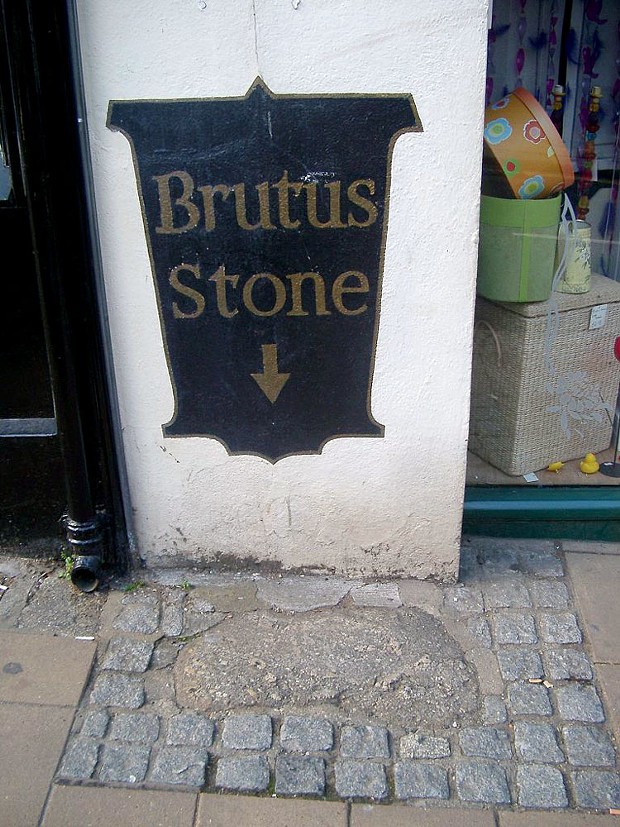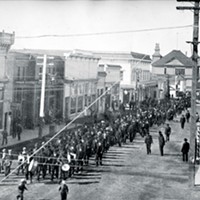
GNU Free Documentation License
The granite Brutus Stone on which, the story goes, Trojan hero Brutus first set foot when he arrived at his eponymous island. It's now on Totnes, Devon, Fore Street.
[
{
"name": "Top Stories Video Pair",
"insertPoint": "7",
"component": "17087298",
"parentWrapperClass": "fdn-ads-inline-content-block",
"requiredCountToDisplay": "1"
}
]
"All the Britons dye themselves with woad which produces a blue color, and makes their appearance in battle more terrible." — Julius Caesar, De Bello Gallico
The etymologies of the names of most countries are mostly non-controversial. "America" derives from the Italian navigator Amerigo Vespucci (1454-1512), who made two trips to the so-called New World, claiming to have discovered it. Cartographer Martin Waldseemüller apparently believed him, publishing a map in 1507 with the name America on what is now called South America. "Canada" comes from the Huron-Iroquois word kanata (village), popularized by French explorer Jacques Cartier. How about "Britain?" This is a confusing word at best, since we have Great Britain (the island comprising England, Scotland and Wales) and the British Isles (ditto, plus Ireland, the Isle of Man and some 6,000 smaller islands), while "Britain" on its own is obsolete.
In the Middle Ages, it was common knowledge that the name Britain derived from Brutus of Troy, the guy who landed on the coast of the county of Devon when giants inhabited the island. Since the giants had no weapons, they were easy prey to the arrows fired by Brutus' men. When only their leader Goemagot was left, he was challenged to a wrestling match by the warrior Corineus, who tossed him over a cliff — you can still see the bloodstains in the red rock below Salcombe Castle in Devon! The 12th century cleric Geoffrey of Monmouth penned the tale in gory detail in his History of the Kings of Britain, the same book in which King Arthur is legitimized as a descendant of the Brutus.
Brutus wasn't Geoffrey's invention, however. We can trace that back another 300 years to the Historia Brittonum, an anonymous 9th century "historical" compilation in which Brutus is identified as a grandson of the Trojan hero Aeneas. According to Roman writer Virgil (70–19 B.C.) in his monumental poem Aeneid, Aeneas, son of prince Anchises and the goddess Aphrodite/Venus, was one of the few Trojans to escape when Troy fell. After many (many!) adventures worthy of epic poetry, Aeneas ended up in Italy where his son Ascanius founded the precursor of the city of Rome. In Geoffrey's account, Brutus was exiled from Italy after accidentally killing his father in a hunting accident. He wandered all over, having the requisite passel of adventures before landing on Totonesium litus, the coast of Totnes in Devon, hence the Brutus Stone on Totnes' Fore Street. Brutus, having given his own name to the island (and Corineus' name to Cornwall) went on to found the city of Troia Nova (New Troy) on the banks of the River Thames. The name corrupted to Trinovantum before it was called London.
So much for legends. Trinovantum actually derives from the Trinovantes people of Iron Age Britain. As for Brutus, he seems to have been a much later invention than Virgil's Aeneid. The name "Britain" probably derives from the Celtic word Pretani, meaning "painted ones" (see the quote above), surviving in the modern Welsh name for Great Britain, Prydain. The Greek explorer Pytheas of Massalia, voyaging to northwest Europe around 325 B.C., may have been the first to link Pretani with the Britannic islands.
I think I'll stick to the United Kingdom.
Barry Evans (he/him, [email protected]) needs very little encouragement to give a spirited a cappella rendition of the song "Woad" (the blue dye used by ancient Britons to decorate their bodies).
Speaking of History, Great Britain
-

A Brief History of Dildos
Apr 11, 2024 -

Humboldt Bay Timeline
Oct 12, 2023 -

Chinese Again in Humboldt, Part Three
May 25, 2023 - More »
Comments (2)
Showing 1-2 of 2
more from the author
-
A Brief History of Dildos
- Apr 11, 2024
-
Eclipse!
- Mar 28, 2024
-
The Little Drone that Could
- Mar 14, 2024
- More »
Latest in Field Notes
Readers also liked…
-
Trouble on the Line: The Reality Part 2
- Nov 3, 2022
































